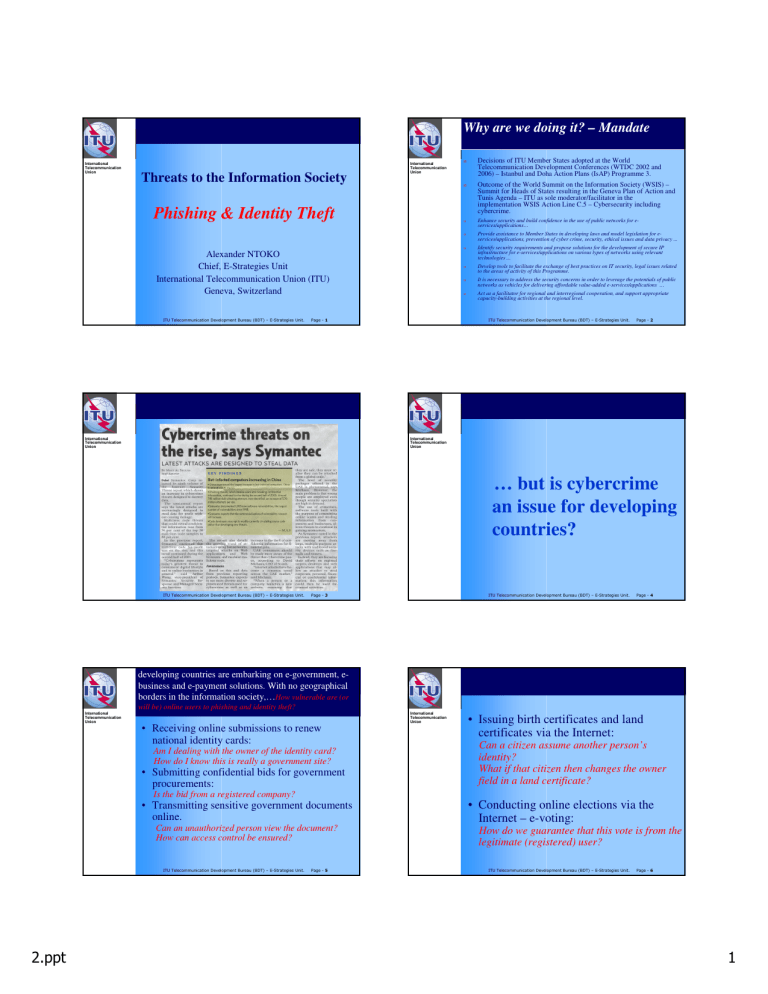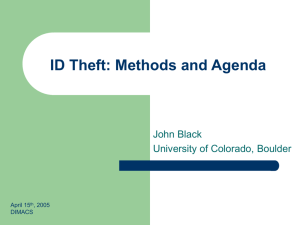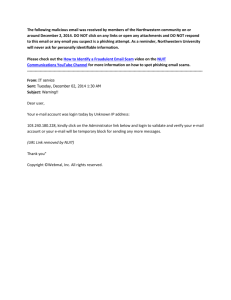Why are we doing it? – Mandate
advertisement

Why are we doing it? – Mandate International Telecommunication Union Threats to the Information Society International Telecommunication Union Phishing & Identity Theft Alexander NTOKO Chief, E-Strategies Unit International Telecommunication Union (ITU) Geneva, Switzerland International Telecommunication Union o Decisions of ITU Member States adopted at the World Telecommunication Development Conferences (WTDC 2002 and 2006) – Istanbul and Doha Action Plans (IsAP) Programme 3. o Outcome of the World Summit on the Information Society (WSIS) – Summit for Heads of States resulting in the Geneva Plan of Action and Tunis Agenda – ITU as sole moderator/facilitator in the implementation WSIS Action Line C.5 – Cybersecurity including cybercrime. o Enhance security and build confidence in the use of public networks for eservices/applications… o Provide assistance to Member States in developing laws and model legislation for eservices/applications, prevention of cyber crime, security, ethical issues and data privacy ... o Identify security requirements and propose solutions for the development of secure IP infrastructure for e-services/applications on various types of networks using relevant technologies ... o Develop tools to facilitate the exchange of best practices on IT security, legal issues related to the areas of activity of this Programme. o It is necessary to address the security concerns in order to leverage the potentials of public networks as vehicles for delivering affordable value-added e-services/applications … o Act as a facilitator for regional and interregional cooperation, and support appropriate capacity-building activities at the regional level. International Telecommunication Union … but is cybercrime an issue for developing countries? developing countries are embarking on e-government, ebusiness and e-payment solutions. With no geographical borders in the information society,…How vulnerable are (or International Telecommunication Union will be) online users to phishing and identity theft? • Receiving online submissions to renew national identity cards: Am I dealing with the owner of the identity card? How do I know this is really a government site? • Submitting confidential bids for government procurements: Is the bid from a registered company? • Transmitting sensitive government documents online. Can an unauthorized person view the document? How can access control be ensured? International Telecommunication Union • Issuing birth certificates and land certificates via the Internet: Can a citizen assume another person’s identity? What if that citizen then changes the owner field in a land certificate? • Conducting online elections via the Internet – e-voting: How do we guarantee that this vote is from the legitimate (registered) user? Citizens, governments and businesses conducting online transactions run the risk of having their Identities stolen… International Telecommunication Union What is Identity Theft? o Identity theft occurs when somebody steals your name and other personal information for fraudulent purposes. Identity theft is a form of identity crime (where somebody uses a false identity to commit a crime). o The act of impersonating another, by means of using the person's information, such as birth date, address, name, and other personal information. o Identity theft is the deliberate assumption of another person's identity, usually to gain access to their finances, privileges, immigration purposes or frame them for a crime. Phishing and Identity Theft International Telecommunication Union How is phishing perpetrated (typical scenario)? 1. 2. 3. 4. 5. User receives Authentic-looking email - In a typical phishing attempt, you will receive an authentic-looking email message that appears to come from a legitimate organisation (bank, business partners or even your own employer). Email contains Link to a Website – Email will usually contains a link to a fake Website. User requested to click on the link to enter some information, or download a software (e.g., security update). Malware or crimeware downloaded from Website and is installed on user’s computer. Downloaded software steals personal information using a wide range of techniques (e.g., Trojan-based keyloggers). o o o o o Phishing (also called brand spoofing or carding) is a technique for acquiring your personal information and subsequently committing fraud in your name, including stealing your identity. Use of social engineering plus malware/crimeware (e.g., Trojans) to steal identity mostly for fraudulent purposes. It's a form of cyber-crime growing faster than the ability of the police or courts to deal with it. About 10 years old but attacks are increasing and getting more sophisticated. "phishing" originated from the word “fishing”. Like in real fishing, scammers lure victims using baits to divulge information that is used for fraudulent purposes. Who perpetrates it? Phishing and Identity Theft International Telecommunication Union What is Phishing? o International Telecommunication Union o o o Phishing can also be perpetrated via telephone (fixed and mobile) Instant Messaging, and it is also possible for you to be phished by postal mail or even in person. o Who perpetrates it? Phishers or scam artists who send out millions of emails, realizing that even if only a few recipients give them enough identifying information, they can profit from the resulting fraud. Internet Service Providers who host phishing websites. According to APWG report of July 2006, USA still tops the list of countries hosting most of the web sites for phishing based keyloggers and Trojans. Between March and July 2006, APWG reports show a slight decrease in hosted websites in the US, decrease in Spain and China but significant growths in Portugal, Russia and Brazil. What happened??? It is very likely that without efforts to combat this problem, more developing countries would be hosts to phishing sites. Phishing and Identity Theft - Trends International Telecommunication Union International Telecommunication Union AntiPhising Working Group Report of March 2006 # $$% & ! " !"# $% & '!# $ (!)# $ * +! '# $ , .! "+# $ .! /+# $ .! # $ /! )'# $01 /! "+# ! AntiPhising Working Group Report of July 2006 '() Phishing-based Trojans - Keyloggers Phishing and Identity Theft International Telecommunication Union Who is (or will be) affected by phishing? o Popular targets are users of online services. Any Internet users who’s email or other personal records have been made availeable on any public forum or online service (e.g., e-government, e-business and ebanking). o More online users in developing countries will be victims of phishing as countries embark on initiatives in e-government, e-business, e-banking and e-payments. o Anyone who has personal information that can be used for online fraud is a potential victim of phishing. International Telecommunication Union Crimeware code which is designed with the intent of collecting information on the end-user in order to steal those users'credentials. Unlike most generic keyloggers, phishing-based keyloggers have tracking components which attempt to monitor specific actions (and specific organizations, most importantly financial institutions and online retailers and ecommerce merchants) in order to target specific information, the most common are; access to financial based websites, ecommerce sites, and web-based mail sites. Example: More than 26 million US veteran records were stolen. Even if these veterans are not all online users, their identities can still be used for online fraud. Number of unique Websites hosting keylogger applications – Source APWG Phishing-based Trojans Phishing and Identity Theft DNS cache poisoning (Redirectors) Man-in-the-middle phishing (Pharming) International Telecommunication Union Redirectors: Redirecting end-users network traffic to a location where it was not intended to go to by exploiting security vulnerabilities in the ISP DNS server to change hosts files and other DNS specific information. Pharming can be implemented through DNS cache poisoning. International Telecommunication Union International Telecommunication Union Scammers are taking advantage of the current US tax season. o o o o o – Example 2 From: abuse@itu.ch [mailto:abuse@itu.ch] Sent: Wednesday, June 14, 2006 9:08 PM To: Prasad, Pradeep Subject: Account Alert *** 05-Mar-2006 *** Pharming: Intercepting information in between two parties’ communications in order to redirect users to a fraudulent location. With the proliferation of unprotected and insecure wireless connections (e.g., WiFi) the effects of Pharming could be significant to the growing number of wireless users. Phishing and Identity Theft o – Example 1 U.S government officials are warning of a growing online presence of phishing scams taking advantage of the current US tax season. Instead of banks or other financial institutions as the purported sender of these scams, the US IRS is being portrayed as the sender of the emails. It is believed the scams are regularly asking recipients for social security details and credit card details. IRS representatives say that their officials would never ask for such information via email. MillerSmiles News 05/03/06 Talk about this article on our phishing news discussion forum Phishing and Identity Theft – Example 3 International Telecommunication Union Dear Valued Member, According to our terms of services, you will have to confirm your email by the following link, or your account will be suspended within 24 hours for security reasons. http://www.itu.ch/confirm.php?account=pradeep.prasad@itu.ch <http://211.97.61.61/Confirmation_Sheet.pif> After following the instructions in the sheet, your account will not be interrupted and will continue as normal. Thanks for your attention to this request. We apologize for any inconvenience. Sincerely, ITU Abuse Department 12 33 ! ! 443 5! - * Phishing and Identity Theft International Telecommunication Union – Example 4 In July, Websense® Security Labs discovered a new malicious website, which distributed malicious code that installs a Trojan Horse on end-users' machines. This potentially occurs without user interaction. The site appeared to be mirroring a World Cup 2006 Soccer website with the exception that they have a lead story regarding the now infamous, Zinedine Zidane head butt incident from the World Cup final against Italy. Upon visiting any of the pages on the site, end-users were potentially infected with a Trojan Horse downloader. This Trojan Horse downloads additional payload code from the site. The site was using the underground "Web Attacker" toolkit (discussed in an earlier alert http://www.websense.com/securitylabs/alerts/alert.php?AlertID=472 ). The Web Attacker toolkit is sold on a Russian website and costs anywhere from $20 to $300. This toolkit allows users to install code that exploits users based on their browser types. The installed code includes one of five different variants, including exploits for old and new vulnerabilities. This site was hosted in the United States. General TRENDS As it expands to other platforms, it’s more difficult to detect International Telecommunication Union Expansion to Mobile - New type of phishing could hit mobile phone users. Mophophishing is where hackers send out fake banking applications to unsuspecting mobile phone users. The users then type their account details into the application thinking they were accessing their accounts when they were actually sending their personal details back to the hacker. Site screenshot: Summary – July 2006 No. of unique phishing reports: 23670 International Telecommunication Union Number of unique phishing sites: 14191 International Telecommunication Union Could Affect various Sectors Knows No Geographical or Time barriers More and more Sophisticated More than 90% linked to Websites Average duration of website 5 days Country hosting the most phishing websites in July: United States Contain some form of target name in URL: 46% Average time online for site: 4.8 days CONCLUSION International Telecommunication Union Even though Internet penetration and usage are still relatively low in some countries in this subregion, now is the time to start taking seriously the challenges brought about by cybercrime as countries increase their reliance on ICTs for social and economic development and as they embark on efforts to build ICT platforms some of which will be delivering critical services to businesses and citizens. In addition to legislation and enforcement mechanisms, identity management and verification is a vital technology solution in the fight against phishing and identity theft. International Telecommunication Union Thank You for Your Attention For further information: http://www.itu.int/ITU-D/e-strategies e-strategies@itu.int +

